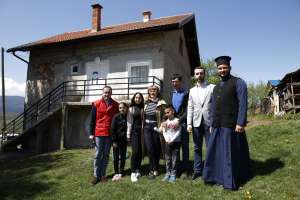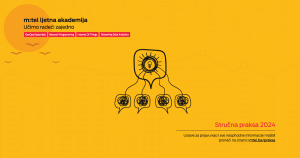SARAJEVO / BRUSSELS, January 20 (FENA) - President of the Party of Democratic Action (SDA) Bakir Izetbegović addressed parliamentarians from the European People's Party (EPP) in the European Parliament tonight, at a special video conference marking the 25th anniversary of the Dayton Accords.
We deliver Izetbegović's address in its entirety:
Honorable Members of the EPP Group, Distinguished Chairman Weber,
Good evening, and thank you for your interest in Bosnia and Herzegovina, on the occasion of the 25th anniversary of the signing of the Dayton and Paris Peace Accords.
It is only worth talking about the past if it can help create a better future. That is how I see my role, and the role of all of us tonight.
The Dayton Agreement, its good and bad sides, are of course better seen from a distance of 25 years, than at the very time of its creation and signing. After a quarter of a century, we are obliged to describe the picture as we see it, aware that it looks different to actors from Bosnia and Herzegovina because they look at it from different political and experiential perspectives.
Everyone agrees that Dayton brought peace, but not the functional organization of Bosnia and Herzegovina. I would also add - but not a fair solution. My father, the late Alija Izetbegović, immediately after he signed the Agreement, stated "the Peace Treaty is unfair - but the continuation of the war is more unfair." He added that "in the situation as it is, and in the world as it is - better peace could not be achieved."
That is true and it is unquestionable.
It is questionable why the world at that time was like that? And what to do to never be like that again?
There are painful questions that will have to be answered someday. Questions about the time that preceded Dayton, which created its unjust side. They are:
Why was an arms embargo imposed at the time of the aggression on BiH, which restrained only the besieged defenders? It did not affect those who committed horrific ethnic cleansing before the eyes of the world and ultimately committed genocide.
Why were the UN-protected zones, Srebrenica and Žepa left to the massacre without a shot being fired and the reaction of international forces? Satellite images vividly recorded the executions that lasted for days.
Why, in the autumn of 1995, a few months after the Srebrenica genocide, the NATO defenders' offensive was stopped with the threat of NATO strikes and they were asked to withdraw from parts of the liberated territory to secure 49% of the territory for the side led by Karadžić and Mladić?
Why almost half of the territory of BiH was left under the domination of Karadžić and Mladić in this way, even though Serbs make up less than a third of the population.
Why was the part of BiH, which was ethnically cleansed by the Serbian army, given the name - Republika Srpska in Dayton?
To put it in one word - why was the perpetrator of crimes and genocide on the territory of BiH awarded in Dayton? What are the consequences of the message that something like this can be observed, tolerated and eventually legalized? Above all, it happens on the soil of civilized Europe, at the end of the twentieth century!
However, even bad peace is better than continuing the conflict. The creators of Dayton claim that the agreement was conceived only as a foundation that implies future upgrades. That in the circumstances of that time nothing more could have been achieved, and that therefore a clause on future voluntary amendments was incorporated into the text of the Agreement.
Some of the Dayton injustices were corrected in the first post-war decade. The agreement really foresaw its own evolution and changes that must be implemented by agreement in the BiH Parliamentary Assembly. And such agreements have been reached with strong mediation of the international community. The entity armies are united into a single Armed Forces of BiH, the entity border services into a single Border Service of BiH, the entity intelligence services into a single Intelligence and Security Agency of BiH, etc.
Serbian representatives also voted for the changes and then later began to change their minds and demand a return to the "original Dayton". There can be no retrograde returns, of course. If we start going back, who knows how far they could go, and what dangers it could bring.
It is necessary to go forward. We have a lot of work ahead of us if we want to build a state that will guarantee equality and prosperity to the citizens, especially to the young generation who are intensively leaving the country. Bosnia and Herzegovina has come a long way in stabilization, but it is still a country of severe discrimination, constant tensions, daily provocations and persistent blockades. Bosnia and Herzegovina is a country where the decisions of the European Court of Human Rights, which are a decade old, are not being implemented. It is similar to the decisions of the BiH Constitutional Court, which politicians openly oppose.
In Bosnia and Herzegovina, war criminals are glorified, genocide is denied, and student dormitories are named after convicted war criminals. Radovan Karadžić, Biljana Plavšić and Nikola Koljević were decorated with entity decorations. 18% of Bosniaks and Croats live in the entity of Republika Srpska, but only 3% are employed in state institutions. Despite the court rulings, Bosniak children have been denied the constitutional right to call their own language Bosnian in this entity. Republika Srpska is defined by the Constitution as a multiethnic entity of equal peoples and citizens, but schools are consecrated by Orthodox priests and state institutions have their own Orthodox patron saint days.
Part of the problem we have been living with for 25 years stems from the Dayton structure itself, from the possibilities that its construct provides. In the last two years, the SNSD and HDZ parties have used such opportunities. SNSD is not satisfied with one of the verdicts of the BiH Constitutional Court, demands the departure of foreign judges, who are certainly the most professional and impartial in the Court, and keeps the work of the Council of Ministers and the Parliamentary Assembly semi-blocked until this condition is met. A similar thing is with HDZ, which is not satisfied with the BiH Election Law, so it stopped the implementation of election results from two years ago and the appointment of a new Government of the Federation of BiH until the Election Law is amended in accordance with their requirements.
Part of the problem stems from the non-implementation of essential annexes to the Dayton Accords. In the first place, this refers to Annex VII, which guaranteed the return of people to pre-war addresses. The property has been returned. A huge percentage of people did not return because they do not have a job, security, because they are exposed to pressure and discrimination. Annex VI guaranteed the country without discrimination and is far from full implementation. Annex IX provided for the establishment of state corporations and was not implemented. Annex X refers to the High Representative's engagement, which should have been daily and intense, but has almost died out.
What is next to do? Is Dayton 2, constitutional reform, and quick interventions realistic? Or is the gradual transition from the "Dayton" to the "Brussels phase" through the acceleration of BiH's European path more realistic? I believe that a combination of the two is possible and realistic. We need to remove the mechanisms that allow blockades because at this rate we could travel to the "Brussels phase" for the next 30 years.
In the beginning, it is necessary to resolve the knot that is tightening between Croat and pro-Bosnian parties. Pro-Bosnian parties are Bosniak and left-wing parties that have four times as many voters and parliamentarians as Croat parties. The Croat side insists on the so-called "legitimate representatives", on the ethnic principle and the domination of the houses of peoples, the pro-Bosnian side insists on the civic principle and strengthening the influence of the representative houses. We need to find a balance that does not jeopardize either side.
Finally, accelerate the European path of BiH, accelerate the entry into the "Brussels phase". We need European standards and principles that will really come to life in BiH, in accordance with Article 2 of the Copenhagen criteria, which prescribes equality, respect for human rights and the rule of law.
It is necessary to act according to the Opinion of the European Commission on the application for BiH membership in the EU with 14 defined priorities - Align the BiH Constitution with the European Convention on Human Rights and Fundamental Freedoms - Implement a number of judgments of the European Court of Human Rights that require BiH to provide all BiH citizens with the same rights in the candidacy and election process - Further strengthen the civil principle, strengthen the state, strengthen the rule of law in Bosnia and Herzegovina.
It is not the entities, cantons, political parties and leaders that will guarantee the security, freedom and equality of every man in every inch of the territory of BiH in the future.
Equality, protection and equal opportunities can only be guaranteed by the effective rule of law.
(FENA) A. B.









